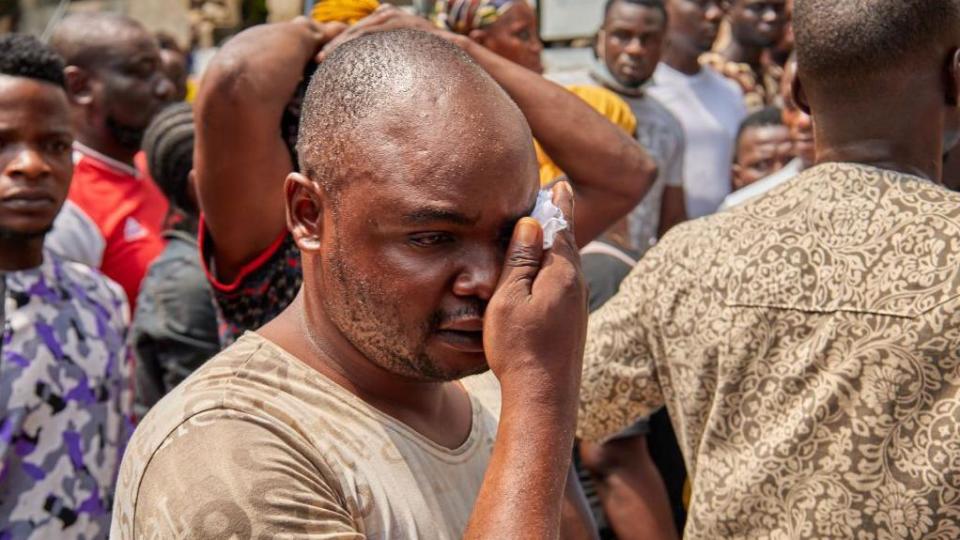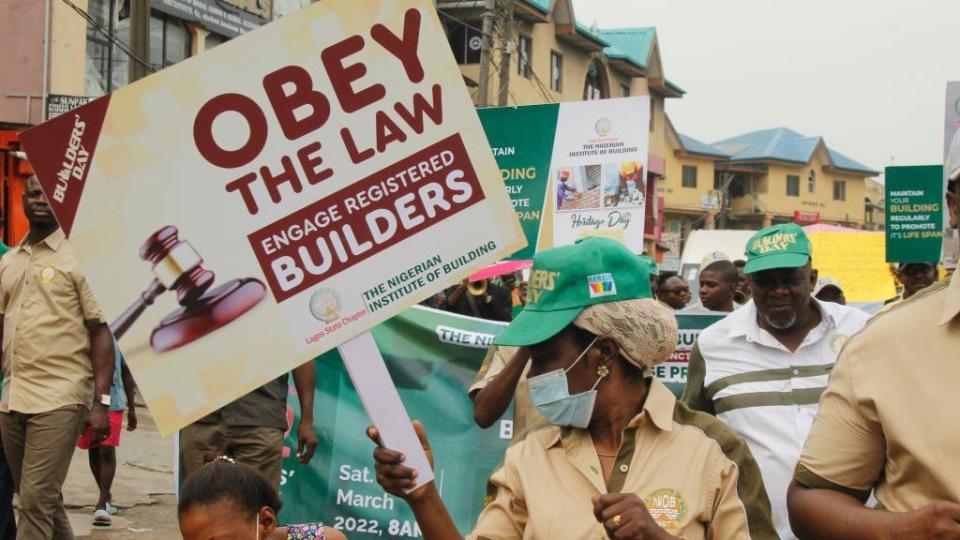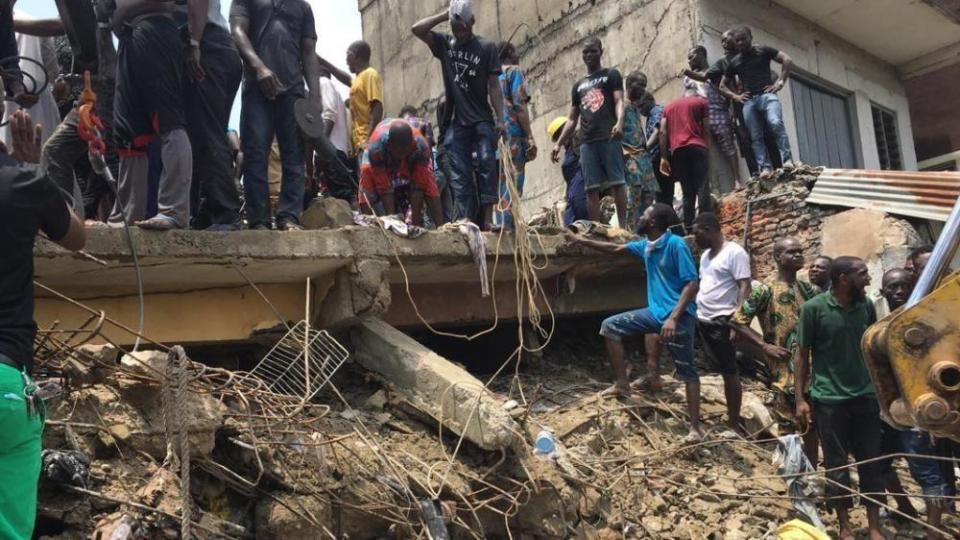This year, an average of one building has collapsed every two weeks in the Nigerian metropolis of Lagos.
The commercial costs can be calculated, but no number can ever be put on the value of the lives lost under the rubble.
The gaps between buildings, which have been replaced by piles of rubble, are a sign of failed governance and have prompted accusations that contractors are trying to cut corners to save money.
There are rules, there are maintenance schedules, there are inspectors – but the system doesn’t work.
Those responsible are never held accountable and therefore nothing ever changes.
Lagos, dubbed “the construction capital of Nigeria” by an expert who spoke to the BBC, has been the scene of at least 90 building collapses in the past 12 years, killing more than 350 people, according to the Nigerian Engineering Regulatory Council.
One of the most infamous incidents occurred in 2021.
Sunday Femi was just metres away, in the upmarket suburb of Ikoyi, when a 21-storey block of luxury apartments under construction collapsed, killing 42 people.
After the loud crack, he was covered in dust.
“Like many, I rushed in to see if I could help some of the people who were trapped. Unfortunately, I knew some of the people who died and I think about them every day,” he says, reflecting on what happened almost three years ago.


The liquor seller had spoken to some construction workers just before they entered the construction site.
He still works in the area and the conversation among locals often turns to those events and their possible causes.
Metal plates protect the site from prying eyes, but through the cracks in the gate, piles of broken concrete can still be seen.
When they knocked on the entrance to the ill-fated complex, two fierce-looking guards opened the door and said they had instructions not to allow anyone except state government officials to enter the premises.
Just as the site is sealed off from the public, so too is the official investigation into the collapse, which has been in the hands of the state governor since he received it in 2022.
Reportedly, a panel of experts drew up a list of recommendations after the investigation, but this too has not been made public.
The BBC has repeatedly asked the Lagos State authorities to see the recommendations and report into the Ikoyi building collapse, but neither has been made available.
However, the coroner gave her the floor and in 2022 she didn’t hold back.
In a scathing judgment on the deaths, Chief Justice Oyetade Komolafe attributed the building’s collapse to the irresponsibility and negligence of government agencies that should have approved and supervised the plans and construction.
Lagos’ population is growing rapidly and is now estimated at over 20 million.
As the city grows, so does the demand for housing and commercial properties. Sometimes it feels like construction is happening everywhere, like one big construction site.
Before work can begin, plans must be approved by the Lagos State Physical Planning Permit Agency. Inspectors from the Lagos State Building Control Agency (LASBCA) must then view the site and monitor progress at each stage of construction.
And the Nigeria Standards Organisation must ensure that only suitable building materials enter the market.
But often the procedures are not followed.


Inside the offices of LASBCA, all seems calm. There is no sense of urgency about the problems or challenges the organization faces.
Spokesman Olusegun Olaoye acknowledges the criticism but denies allegations that officials were bribed to issue false certificates, blaming it rather on a lack of resources.
“We currently have about 300 building supervisors and inspectors, but we would like to expand that number,” he says.
Experts agree that more supervisors are needed.
According to architect and construction expert Muhammad Danmarya, there should be thousands of them.
“Three hundred is just not good for a state like Lagos. Every local government area should have at least 100 inspectors and supervisors and Lagos has 57 of them,” he argues.
“There is construction going on everywhere you look, so it is important that there is constant supervision and inspection.”
With that regime lacking across the state, some less scrupulous companies are getting away with violating building codes, using substandard materials and hiring poorly trained workers. Those are three of the reasons cited for the high frequency of collapses.
“They just come here to pick us up when they have a job for us and pay us when we’re done,” says worker Habu Isah, who has worked on construction sites for years.
“I never had any training, I learned everything on the job.”
But even if violations are found after a collapse, the state building authority does not take legal action.
“As far as I know, there have been no prosecutions for collapsed buildings in Lagos in the past,” admits LASBCA’s Olaoye.
“I know the statistics are worrying, but there are ongoing efforts to stop the trend.”


Perceived political influence can be a barrier to prosecution.
“If you have links with those in power, nothing will happen to you even if you are the culprit in a building that collapses,” said a Lagos State politician who spoke to the BBC on condition of anonymity.
“We have seen it so many times: some of the high-profile cases involve structures of high-ranking individuals, and they are still walking around freely.
“If you are rich and well connected in Nigeria, you can easily avoid problems.”
The Lagos State Emergency Management Agency has already recorded 19 building collapses this year, with the final total likely to be the highest in the past decade.
But there are still times when we forget lessons.
The chairman of the Nigerian Technology Regulatory Council recently said the country lacks the capacity to adequately investigate the situation.
“We don’t have the expertise, the equipment and the resources to do this,” said Prof. Sadiq Abubakar.
Meanwhile, construction workers and others continue to pay the price with their lives.
Additional reporting by Andrew Gift
More BBC stories from Nigeria:


Go to BBCAfrica.com for more news from the African continent.
Follow us on Twitter @BBCAfricaon Facebook on BBC Africa or on Instagram at bbcafrica
BBC Africa Podcasts







